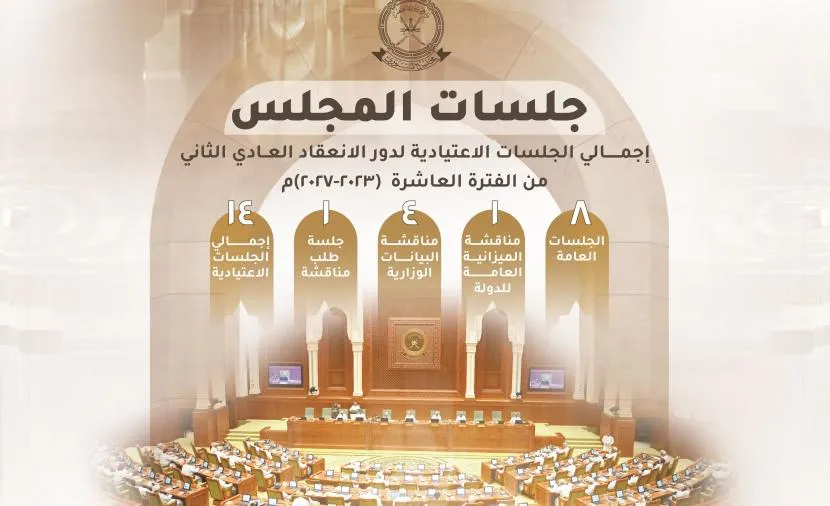The Council's recently published media report details its extensive work, highlighting key indicators and figures across legislation, oversight, and sessions. During this period, the Shura Council convened 14 regular sessions. Four of these were specifically allocated for in-depth discussions on ministerial statements from critical service sectors, including the Ministry of Education, Ministry of Heritage and Tourism, Ministry of Housing and Urban Planning, and Ministry of Commerce, Industry and Investment. These sessions addressed current challenges, proposed solutions for developmental plans, and outlined future strategies of government entities. A dedicated session also focused on the 2025 State General Budget and temporary employment initiatives with the Minister of Labor.
In its legislative capacity, the Council meticulously reviewed 16 draft laws and 7 draft agreements submitted by the government. Notable among these were the draft State General Budget for 2025, the Real Estate Regulation Law, the Anti-Human Trafficking Law, the Telecommunications and Information Technology Regulation Law, the State Dues Collection Law, and the Persons with Disabilities Rights Law. The Council also proposed three new draft laws, including initiatives to support sports, cultural, and youth activities, and a law to combat tobacco and its derivatives.
Oversight mechanisms were actively utilized, with Council members submitting 169 monitoring tools. These included 19 questions across various sectors (health, education, social services), 121 requests for information, and 10 urgent statements addressing diverse citizen issues. The report also underscored the efficient functioning of the Council's internal bodies, with 12 meetings held by the Shura Council Office and 92 meetings by permanent committees, resulting in the completion of 98 topics.
Furthermore, the report emphasized the high level of coordination between the Shura Council and the Council of Ministers, marked by two joint meetings that reinforced the Council's role in supporting comprehensive development in Oman. A strong partnership with the State Council was also evident, with continuous coordination and joint sessions leading to the approval of 11 draft laws, showcasing the integrated approach to national legislative work. Internationally, the Shura Council enhanced Oman's parliamentary diplomacy by participating in 22 regional and international parliamentary events, including those of the Inter-Parliamentary Union and the Arab Parliamentary Union.
Overall, the first half of the tenth term (covering the first and second sessions) saw 47 legislative actions and over 300 oversight tools, demonstrating a significant legislative and monitoring momentum. The annual media report, disseminated through social media and traditional media, aims to foster community participation by providing transparency on the Council's performance, aligning its work with the "Oman 2040" vision and the Sultanate's five-year plans. This continuous engagement reaffirms the Council's dedication to achieving national aspirations under the wise guidance of His Majesty Sultan Haitham bin Tariq.
Контекст для туристов и экспатов
Хотя отчет о работе Совета Шуры может показаться сугубо внутренней новостью, его содержание имеет важное значение для русскоязычных туристов и экспатов, проживающих или планирующих посетить Оман. Активная и продуктивная работа парламента, как это демонстрирует данный отчет, является ключевым показателем политической стабильности и эффективного управления в стране. Это создает предсказуемую и безопасную среду, что крайне важно как для комфортного отдыха, так и для долгосрочного проживания и ведения бизнеса.
Некоторые упомянутые законодательные инициативы напрямую или косвенно затрагивают интересы иностранцев. Например, работа над «Законом о регулировании недвижимости» (Real Estate Regulation Law) может повлиять на условия покупки или аренды жилья, что особенно актуально для экспатов. Обсуждение «Закона о борьбе с киберпреступностью» (Cybercrime Law) и «Закона о регулировании телекоммуникаций и информационных технологий» (Telecommunications and Information Technology Regulation Law) подчеркивает стремление Омана к регулированию цифрового пространства, что важно для всех пользователей интернета.
Упоминание отчета Министерства наследия и туризма в числе обсуждаемых министерских заявлений свидетельствует о постоянном внимании правительства к развитию туристического сектора. Это означает, что Оман продолжает инвестировать в инфраструктуру и услуги для посетителей, что делает страну еще более привлекательной для путешествий. В целом, активная законотворческая деятельность и прозрачность в работе государственных органов способствуют созданию благоприятного инвестиционного климата и повышению общего качества жизни, что является позитивным сигналом для всех, кто связывает свое будущее с Оманом.

